|
|
|
Sort Order |
|
|
|
Items / Page
|
|
|
|
|
|
|
| Srl | Item |
| 1 |
ID:
151115
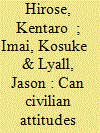

|
|
|
|
|
| Summary/Abstract |
Are civilian attitudes a useful predictor of patterns of violence in civil wars? A prominent debate has emerged among scholars and practitioners about the importance of winning civilian ‘hearts and minds’ for influencing their wartime behavior. We argue that such efforts may have a dark side: insurgents can use pro-counterinsurgent attitudes as cues to select their targets and tactics. We conduct an original survey experiment in 204 Afghan villages and establish a positive association between pro-International Security Assistance Force attitudes and future Taliban attacks. We extend our analysis to 14,606 non-surveyed villages and demonstrate that our measure of civilian attitudes improves out-of-sample predictive performance by 20–30% over a standard forecasting model. The results are especially strong for Taliban attacks with improvised explosive devices. These improvements in predictive power remain even after adjusting for possible confounders, including past violence, military bases, and development aid.
|
|
|
|
|
|
|
|
|
|
|
|
|
|
|
|
| 2 |
ID:
151116


|
|
|
|
|
| Summary/Abstract |
Cultivating cooperation with local populations is necessary for peacekeeping operations to effectively prevent and reduce violence. To accomplish their missions in complex foreign theaters of operation, peacekeepers must solicit information about local political actors, social networks, and violence. Under what conditions do local populations cooperate with United Nations peacekeepers? How does exposure to peacekeeping security activities, relief activities, or abuse – three of the primary ways that local communities experience peacekeepers – affect the likelihood that individuals cooperate with peacekeepers by providing information to them? Using an original survey of a random sample of residents of metropolitan Port-au-Prince, Haiti, we show that people who are exposed to security and relief activities by the United Nations peacekeeping operation, MINUSTAH, have more positive opinions of how effective they are, and are more willing to cooperate with peacekeepers by providing them with information. On the other hand, exposure to abuse dramatically undermines civilian opinions of how effective, benevolent, and abusive peacekeepers are but has a smaller effect on cooperation. These findings present an opportunity and challenge for peacekeepers: if public opinion and cooperation are responsive to peacekeeper policy, then peacekeepers must deliver services and prevent abuse in order to solicit the cooperation that is necessary for mission success.
|
|
|
|
|
|
|
|
|
|
|
|
|
|
|
|
| 3 |
ID:
151112
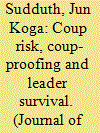

|
|
|
|
|
| Summary/Abstract |
Under what conditions do political leaders enact ‘coup-proofing’ strategies? There is a broad consensus in the literature that political leaders who face a higher risk of a coup will employ coup-proofing strategies that reduce the military’s capabilities to organize a coup. A closer look at the theory and empirical analyses of earlier studies, however, suggests that the presumed relationship between coup risk and coup-proofing should be re-examined. Drawing on insights from formal studies of authoritarian power-sharing, this article proposes that political leaders become less likely to initiate coup-proofing efforts as the coup risk increases. The reason is that leaders’ coup-proofing actions in themselves could prompt the military to launch a coup and thus political leaders will hesitate to offend officers when they face a high risk of a coup. The statistical models in this article estimate a latent coup risk by aggregating multiple indicators that capture the military’s willingness and ability to organize a coup. The empirical results strongly support the proposition that coup-proofing efforts taken by leaders decrease as coup risk increases.
|
|
|
|
|
|
|
|
|
|
|
|
|
|
|
|
| 4 |
ID:
151117
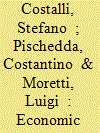

|
|
|
|
|
| Summary/Abstract |
There is a consensus that civil wars entail enormous economic costs, but there is little systematic analysis of the determinants of their heterogeneous destructiveness. Moreover, reliably estimating these costs has proven challenging, due to the complexity of the relationship between violence and socio-economic conditions. In this article, we study the effect of ethnic fractionalization of war-torn countries on the economic consequences of civil war. Building on an emerging literature on the relationships between ethnicity, trust, economic outcomes, and conflict processes, we argue that civil wars erode interethnic trust and highly fractionalized societies pay an especially high price, as they rely heavily on interethnic business relations. We use the synthetic control method to construct appropriate counterfactuals and measure the economic impact of civil war. Our focus is on the years of armed conflict in a sample of 20 countries for which we observe an average annual loss of local GDP per capita of 17.5%, though with remarkable variation across cases. The empirical analysis provides supporting evidence in the form of a robust positive association between ethnic fractionalization and our measures of war-induced economic costs.
|
|
|
|
|
|
|
|
|
|
|
|
|
|
|
|
| 5 |
ID:
151113
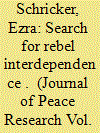

|
|
|
|
|
| Summary/Abstract |
The existing conflict literature tends to treat interdependence between rebel groups as a binary category: either groups are allied or unallied, fragmented or unified, interdependent or independent. Yet much of our qualitative knowledge suggests that interdependence is better understood as a matter of degree where certain groups exert a disproportionate influence over their counterparts. The challenge is how to identify the degree of interdependence in practice. As a solution, I conceptualize interdependence as a property of a system of interactions between rebel groups and government forces within and across borders. My approach is to model the entire system of interactions in order to test hypotheses related to the directionality of influence and the potential for military coordination between groups. I demonstrate the utility of this approach by examining the relationship between Pakistan and the two major factions which make up the Taliban organization – the Afghan and Pakistani Taliban. I analyze the triangular system with a vector autoregressive model and monthly time series data on violent actions initiated by each group from January 2008 to February 2013. The substantive findings support much of the received wisdom concerning Pakistan’s disparate relationship to both groups, which is characterized by antagonism with the Pakistani Taliban and collusion with the Afghan Taliban. The results also suggest that the claims of interdependence between the two Taliban groups have been overstated.
|
|
|
|
|
|
|
|
|
|
|
|
|
|
|
|
| 6 |
ID:
151114
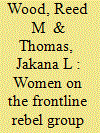

|
|
|
|
|
| Summary/Abstract |
Despite the frequent participation of women in armed groups, few studies have sought to explain the variation in their roles across different rebellions. Herein, we investigate this variation. We argue that the political ideology a group adopts plays a central role in determining the extent of women’s participation, particularly their deployment in combat roles. Specifically, we link variations in women’s roles in armed groups to differences in beliefs about gender hierarchies and gender-based divisions of labor inherent in the specific ideologies the groups adopt. We evaluate hypotheses drawn from these arguments using a novel cross-sectional dataset on female combatants in a global sample of rebel organizations active between 1979 and 2009. We find that the presence of a Marxist-oriented ‘leftist’ ideology increases the prevalence of female fighters while Islamist ideologies exert the opposite effect. However, we find little evidence that nationalism exerts an independent influence on women’s combat roles. We also note a general inverse relationship between group religiosity and the prevalence of female fighters. Our analysis demonstrates that political ideology plays a central role in determining whether and to what extent resistance movements incorporate female fighters into their armed wings.
|
|
|
|
|
|
|
|
|
|
|
|
|
|
|
|
|
|
|
|
|